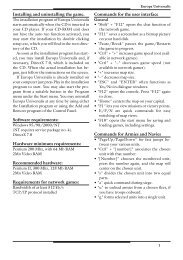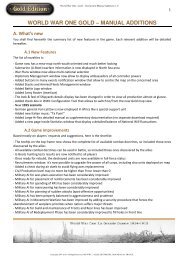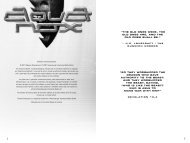Create successful ePaper yourself
Turn your PDF publications into a flip-book with our unique Google optimized e-Paper software.
● In 1915, Italy will be very receptive to territory promises.<br />
D’Annunzio: this is an Italian special rule.<br />
Starting with 1915, any Diplomatic Action check involving Italy implies a<br />
prior “D’Annunzio” check (famous Italian poet and orator). The detailed<br />
procedure for the “D’Annunzio” check is in the Appendices.<br />
● If the check succeeds, D’Annunzio delivers a powerful diplomatic<br />
blow, and the subsequent Diplomatic Action is checked,<br />
disregarding the opposite side’s AMBassadors and the<br />
modifiers favorable to the opposite side. The D’Annunzio bonus<br />
is in addition to these effects. This may bring Italy into one side in<br />
a single turn.<br />
● The success probabilities rise in 1915, and mostly toward the Entente<br />
(because Italy dislikes Austria-Hungary).<br />
● If Austria-Hungary promises Trentin to Italy, the Central Powers’ -2<br />
penalty is cancelled and is reduced to -1.<br />
● If France surrenders, the D’Annunzio rule is cancelled.<br />
Great Britain<br />
Because of the Entente Cordiale (1904) and of the 1907 and 1911 military<br />
agreements with France, Great Britain is “officially” a member of Entente.<br />
Forum Hints on Diplomacy – November 2008<br />
1. Place your Ambassadors (value 0 to 3, a 0 is a decoy) in neutral<br />
countries to incite them to join your side. You are however limited<br />
to a maximum of 2 Amb per country. You then have 1 Diplomatic<br />
Action allowed each turn in one neutral country of your<br />
choice, where you have a non-decoy Amb. Once the action is<br />
implemented, Amb from both sides will be removed and the minor<br />
nation’s attitude will be affected.<br />
2. To succeed in a Diplomatic Action, try to place enough ‘good’ Amb,<br />
hoping that the opposite side has less than you. Don’t forget also<br />
the geopolitical bonus and penalty that may exist for the neutral<br />
nation in favor of one side or the other.<br />
3. You may receive new extra Amb each Interphase. The number may<br />
depend on the country you play, but also on your “reputation”,<br />
based on the military situation (for instance more Amb if you won<br />
in a Grand Offensive, less if you lost, etc).<br />
4. Think about buying new Ambassadors each Interphase! Each<br />
major power may buy extra Amb to gain more diplomatic efficiency.<br />
5. Some neutral countries may enter the war via diplomatic action,<br />
such as Great Britain, Italy, the Ottoman Empires or the United<br />
States for the major nations, or Belgium, Bulgaria, Greece,<br />
Rumania for the minor nations. Some far away nations may also<br />
join (e.g. Japan, Brazil, etc), mostly via historical or semi-historical<br />
As a consequence, Great Britain may never enter the war on the side of the<br />
Central Powers.<br />
● Unlike the other countries, in August 1914, Great Britain’s Diplomatic<br />
level is unknown to the Central Powers. Thus, the Central Powers will<br />
be unsure of Great Britain’s reaction at the start of the war. The initial<br />
British level is randomly set from 1 to 5.<br />
● In addition, if Germany invades Belgium, Great Britain reacts. An<br />
adjustment to the initial British level is made, between -2 and nothing<br />
(higher probability of a sharp drop!).<br />
NB: If France invades Belgium, a similar check is made, but the adjustment<br />
is positive (opposite).<br />
Also, starting with 1915, the British level automatically decreases by -1<br />
during each Interphase start.<br />
British Diplomacy<br />
Even while in Peace, Great Britain has a pro-Entente diplomacy.<br />
Depending on the Diplomatic Level, it provides Entente with 0 to 3 AMB<br />
during each Interphase.<br />
In August 1914, she provides 2 AMB. Entente player freely uses the British<br />
AMB (he may even deploy them in Great Britain.<br />
events. A neutral joins the war when its diplomatic level reaches a<br />
critical level. In such a case, it enters the war on your side versus<br />
the opponents’ (or vice versa). Diplomacy is no longer possible in<br />
such a case (you may just attempt to negotiate peace).<br />
6. Think about concentrating your Amb in minor nations of the<br />
greatest interest or use for your side, in order to get the maximum<br />
diplomatic impact (or reduce that of the enemy). Remember,<br />
nothing is ever to be taken for granted.<br />
7. Great Britain is Pro-Entente, so even if it does not join the war from<br />
the outset, it will do so rather quickly in the early months of the<br />
conflict. Italy and Rumania are also very “receptive” to promises on<br />
their war goals, which you can decide to enact as a Political Action<br />
during the Interphases.<br />
8. There are lots of modifiers for diplomatic checks with any given<br />
country. Obviously the decisive thing is which side has more points<br />
worth of diplomats there, but there are also others. Speaking in<br />
boardgame terms, number of diplomats determine the column<br />
used on the resolution table, while other modifiers modify the dice<br />
roll. Most of those roll modifiers, you can’t influence.You either have<br />
them or not. Like, capture of enemy cities, Belgrade for example.<br />
There are a few which can be given attention to, and these are the<br />
national one.<br />
For example: no Austrian diplomat to Romania or Italy, if possible, and<br />
let the Russians handle Entente diplomacy in Bulgaria, if possible.<br />
World War One: La Grande Guerre 1914-1918 93
















